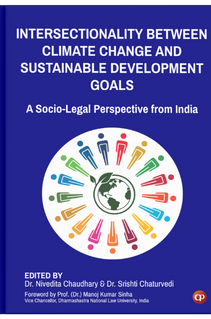Foreword: Intersectionality Between Climate Change and Sustainable Development Goals: A Socio-Legal Perspective from India

Prof. (Dr.) Manoj Kumar Sinha
Vice Chancellor, Dharmashastra National Law University, Jabalpur, Madhya
Pradesh, India.
10.46679/97881967805240
This chapter is a part of: Intersectionality Between Climate Change and Sustainable Development Goals: A Socio-Legal Perspective from India
ISBN (Ebook):978-81-967805-2-4
ISBN (Hardcover Print):978-81-967805-0-0
ISBN (Softcover Print):978-81-967805-3-1
© CSMFL Publications & its authors.
Published: August 28, 2025
Foreword
The twenty-first century presents humanity with unprecedented challenges, of which climate change is undeniably the most far-reaching in both its scope and severity. As its multidimensional consequences unfold it becomes increasingly clear that no nation, community, or individual is immune. For a country like India, navigating the dual imperatives of economic development and ecological sustainability requires not only robust policy frameworks but also informed, interdisciplinary, and inclusive academic inquiry.
It is in this context that I am pleased to introduce the edited volume Intersectionality Between Climate Change and Sustainable Development Goals: A Socio-Legal Perspective from India, curated by Dr. Nivedita Chaudhary and Dr. Srishti Chaturvedi. This timely and commendable compilation is a significant addition to the growing body of literature on climate governance and sustainable development, particularly from the lens of socio-legal scholarship.
The very framing of this volume around “intersectionality” reflects a progressive and nuanced understanding of the contemporary climate discourse. Climate change does not operate in silos, it intersects deeply with social, economic, legal, and cultural realities. The Sustainable Development Goals (SDGs), as articulated by the United Nations in Agenda 2030, provide a universal framework that recognizes the indivisibility of human progress, ecological integrity, and inclusive governance. This volume astutely bridges these frameworks, offering insights that are both academically rigorous and practically relevant.
Structured across six broad thematic areas, ranging from legal and policy approaches to climate change prevention to technological and economic mitigation pathways-the volume brings together a diverse constellation of contributors: legal scholars, policy consultants, doctoral researchers, practitioners, and students from India and abroad. The contributions featured in this volume advance the discourse in meaningful ways by foregrounding the intersections between environmental degradation, structural inequalities, legal responses, and SDGs.
What stands out across the sixteen chapters is not merely their scholarly merit but their clarity of purpose and commitment to real-world impact. Each contribution speaks to a larger vision: a development paradigm that is equitable, rights- affirming, and environmentally resilient. The editors have exercised both academic judgment and editorial vision in curating contributions that complement one another, maintain thematic coherence, and adhere to high standards of legal and interdisciplinary scholarship.
Notably, the volume offers both critique and constructivism – diagnosing gaps in legal regimes, regulatory institutions, and corporate practices, while also suggesting new conceptual frameworks and innovative solutions rooted in participatory governance, inclusive policy, and responsible innovation. Another commendable feature of this book is the diversity of voices and methodologies it brings together. From young scholars to seasoned academics, from doctrinal analysis to policy critique, and from domestic case studies to international reflections, the volume showcases the richness of contemporary legal scholarship in India. This inclusivity is not only methodologically refreshing but also epistemologically necessary if we are to arrive at holistic understandings of such vast and interconnected issues.
What also distinguishes this work is its commitment to accessibility and relevance. The clarity of writing, depth of research, and coherence of arguments make the volume suitable not only for academic readership but also for policymakers, legal practitioners, environmental activists, and development professionals who are actively engaged in shaping India’s response to climate change. It is my hope that it also inspires future interdisciplinary research and teaching on these themes across Indian law schools and policy institutions.
As someone whose academic work has long engaged with issues of constitutional governance, international law, and human rights, I find this volume’s emphasis on climate justice particularly resonant. It moves beyond conventional legal analysis to incorporate social realities, institutional responses, and normative frameworks that affect how climate vulnerability is experienced and addressed.
In acknowledging the efforts behind this publication, I must commend the editors for their meticulous curation and the contributors for their scholarly integrity. Together, they have produced a body of work that does not merely document or describe but seeks to influence, to provoke thought, inform decision-making, and inspire further research.
Volumes like this are essential to shaping a legal and policy culture that is responsive to the complexities of our ecological realities. As India and the world move forward in implementing the SDGs and upholding their commitments under global climate accords, it is critical that such scholarship informs and enriches the processes of law-making, adjudication, and civic engagement.
I extend my best wishes to the editors and contributors for the publication of this volume. May it serve as a valuable resource and inspire further scholarship at the confluence of climate change, law, and sustainable development.
This book is available worldwide via EBSCOhost Academic Collection, EBSCO E- books, Google Play Books, Amazon, World Cat Discovery Service/OCLC, CSMFL Bookstore, and 200+ book resellers and academic content vendors.
Statement on Publication Ethics
We, at CSMFL Publications, are committed to ensure the unbiased and transparent publishing, and upholding the high standards of editorial integrity in our publications. To know more, please read our Statement on Publication Ethics, Editorial Integrity & Misconduct